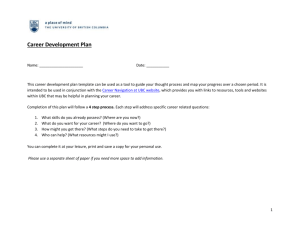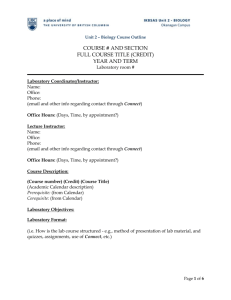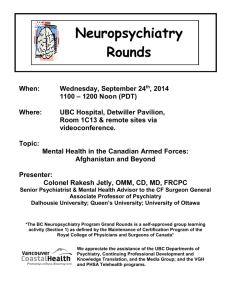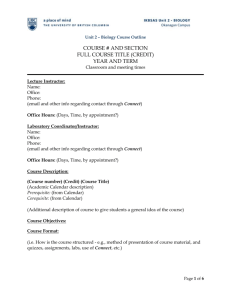BIOL 200, section 001 Cell Biology (3 credits) 2015W T1
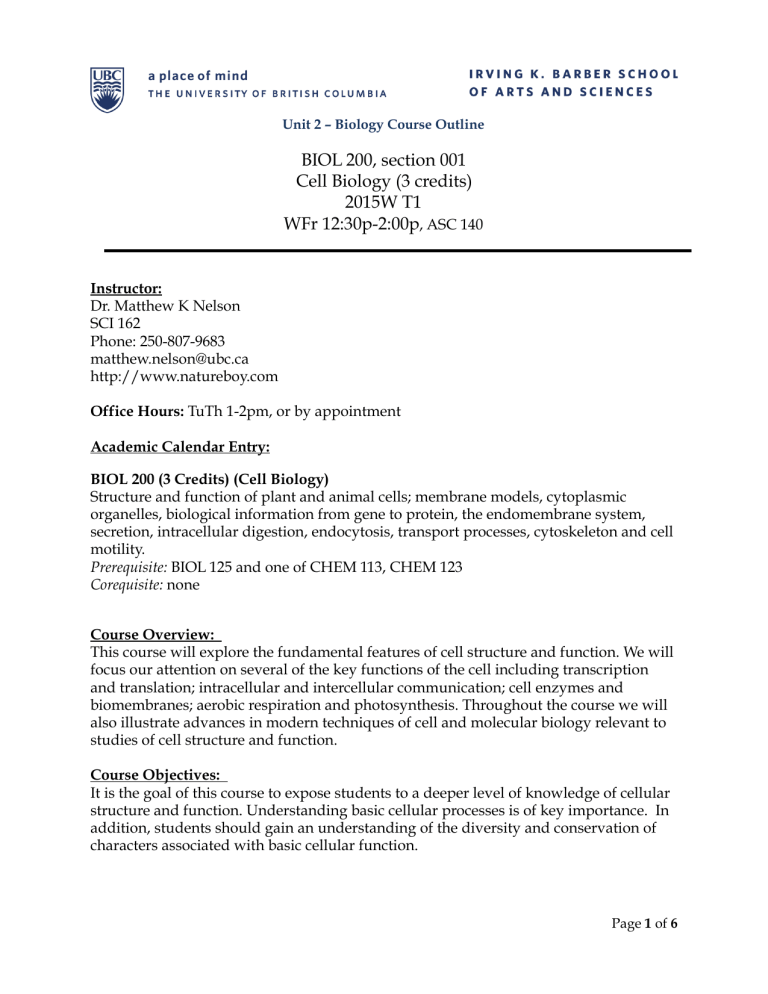
Unit 2 – Biology Course Outline
BIOL 200, section 001
Cell Biology (3 credits)
2015W T1
WFr 12:30p-2:00p
, ASC 140
Instructor:
Dr. Matthew K Nelson
SCI 162
Phone: 250-807-9683 matthew.nelson@ubc.ca http://www.natureboy.com
Office Hours: TuTh 1-2pm, or by appointment
Academic Calendar Entry:
BIOL 200 (3 Credits) (Cell Biology)
Structure and function of plant and animal cells; membrane models, cytoplasmic organelles, biological information from gene to protein, the endomembrane system, secretion, intracellular digestion, endocytosis, transport processes, cytoskeleton and cell motility.
Prerequisite: BIOL 125 and one of CHEM 113, CHEM 123
Corequisite: none
Course Overview:
This course will explore the fundamental features of cell structure and function. We will focus our attention on several of the key functions of the cell including transcription and translation; intracellular and intercellular communication; cell enzymes and biomembranes; aerobic respiration and photosynthesis. Throughout the course we will also illustrate advances in modern techniques of cell and molecular biology relevant to studies of cell structure and function.
Course Objectives:
It is the goal of this course to expose students to a deeper level of knowledge of cellular structure and function. Understanding basic cellular processes is of key importance. In addition, students should gain an understanding of the diversity and conservation of characters associated with basic cellular function.
Page 1 of
Unit 2 – Biology Course Outline
Course Objectives:
This course will explore the fundamental features of cell structure and function. We will focus our attention on several of the key functions of the cell such as gene expression, including its regulation, transcription and translation; intracellular and intercellular communication; cell enzymes and biomembranes; aerobic respiration and photosynthesis. Throughout the course we will also illustrate advances in modern techniques of cell and molecular biology relevant to studies of cell structure and function.
Learning outcomes:
By the end of this course, students should understand and be able to discuss:
• basic cellular processes
• cellular compartments and membranes
• vesicle transport
• function of specialized organelles
• control and timing of cellular functions
•
DNA replication and repair
Course Format:
This is a standard lecture course. You will need to attend class. From time to time I may post supplementary material on natureboy.com
. Connect and Connect mail will be used to post announcements and to provide course-related material. It is your responsibility to check the Connect site at least once a week.
Required Materials:
Essential Cell Biology , Alberts, Bray, Hopkin, Johnson, Lewis, Raff, Roberts, and Walter,
4th edition. Garland Science.
Evaluation and grading:
Midterm #1
Midterm #2
Final
30%
30%
40% oct 9 (tentatively) nov 18 (tentatively)
TBA
Total 100%
Final grades will be based on the evaluations listed above and the final grade will be assigned according to the standardized grading system outlined in the UBC Okanagan
Page 2 of
Unit 2 – Biology Course Outline
Calendar. The Barber School reserves the right to scale grades in order to maintain equity among sections and conformity to University, faculty, department, or the school norms. Students should therefore note that an unofficial grade given by an instructor might be changed by the faculty, department, or school (http://www.calendar.ubc.ca/ okanagan/index.cfm?tree=3,41,90,1014).
Final Examination :
The examination period for 2015 Winter Term 1 is (DEC 7-22). Except in the case of examination clashes and hardships (three or more formal examinations scheduled within a 24-hour period) or unforeseen events, students will be permitted to apply for out-of-time final examinations only if they are representing the University, the province, or the country in a competition or performance; serving in the Canadian military; observing a religious rite; working to support themselves or their family; or caring for a family member. Unforeseen events include (but may not be limited to) the following: ill health or other personal challenges that arise during a term and changes in the requirements of an ongoing job. Further information on Academic Concessions can be found under Policies and Regulations in the Okanagan Academic Calendar http:// www.calendar.ubc.ca/okanagan/index.cfm?tree=3,48,0,0. Out-of-time examination forms can be found at (http://ikbsas.ok.ubc.ca/students/undergrad/forms.html) and must be sent to the Dean’s office.
Missed Graded Work:
Students who, because of unforeseen events, are absent during the term and are unable to complete tests or other graded work, should normally discuss with their instructors how they can make up for missed work, according to written guidelines given to them at the start of the course (see Grading Practices). Instructors are not required to make allowance for any missed test or incomplete work that is not satisfactorily accounted for. If ill health is an issue, students are encouraged to seek attention from a health professional. Campus Health and Counselling will normally provide documentation only to students who have been seen previously at these offices for treatment or counselling specific to conditions associated with their academic difficulties. Students who feel that requests for consideration have not been dealt with fairly by their instructors may take their concerns first to the Head of the discipline, and if not resolved, to the Office of the Dean. Further information can be found at: http://www.calendar.ubc.ca/okanagan/index.cfm?tree=3,48,0,0
.
1.
If a student is unable to write the mid-term examination, has an acceptable and appropriately documented reason, and informs the instructor before the examination is written by the class, the student will be accommodated. You may notify by e-mail ( matthew.nelson@ubc.ca
). A make-up exam must be arranged and written within seven days of the missed exam. Failure to notify prior to the examination will result in zero mark for this examination.
Page 3 of
Unit 2 – Biology Course Outline
2.
All students who miss or plan to miss a regularly scheduled final examination should go to the office of the Associate Dean, Curriculum and Students.
Lecture Outline:
TARGET WEEK sep 8-12 sep 15-18 sep 22-25 sep 29-oct 2 oct 6-9 oct 9
MATERIAL
Chapter 1. Cells / Microscopy
Chapter 2. Chemical basis of life
Chapter 3. Bioenergetics, Enzymes, and Metabolism
Chapter 4. The Structure and Function of the Proteins
Chapter 5. DNA and chromosomes
Chapter 6. DNA replication, repair
Chapter 7. From DNA to protein
MIDTERM 1 (CH 1-6) oct 13-16 oct 20-23 oct 27-oct 30 nov 3-6 nov 10-13 nov 18
Chapter 11. Membrane structure
Chapter 12. Membrane Transport
Chapter 20. Cell communities
Chapter 13. Energy from food
Chapter 14. Photosynthesis and respiration
Chapter 15. Vesicle transport
MIDTERM 2 (CH 7, 20, 11-14) nov 17-20 nov 24-27 dec 1-4
Chapter 17. Cytoskeleton
Chapter 18. Cell Cycle
Chapter 19 (partial). Meiosis
DEC 7, 6pm FINAL EXAM (CH 15, 17-19, comp)
Copyright Disclaimer:
Diagrams and figures included in lecture presentations adhere to Copyright Guidelines for UBC Faculty, Staff and Students http://copyright.ubc.ca/requirements/copyright-
Page 4 of
Unit 2 – Biology Course Outline guidelines/ and UBC Fair Dealing Requirements for Faculty and Staff http:// copyright.ubc.ca/requirements/fair-dealing/ . All material uploaded to Blackboard
Connect that contain diagrams and figures are used with permission of the publisher; are in the public domain; are licensed by Creative Commons; meet the permitted terms of use of UBC’s library license agreements for electronic items; and/or adhere to the
UBC Fair Dealing Requirements for Faculty and Staff.
Access to the Blackboard Connect course site is limited to students currently registered in this course. Under no circumstance are students permitted to provide any other person with means to access this material. Anyone violating these restrictions may be subject to legal action. Permission to electronically record any course materials must be granted by the instructor. Distribution of this material to a third party is forbidden.
Academic Integrity:
The academic enterprise is founded on honesty, civility, and integrity. As members of this enterprise, all students are expected to know, understand, and follow the codes of conduct regarding academic integrity. At the most basic level, this means submitting only original work done by you and acknowledging all sources of information or ideas and attributing them to others as required. This also means you should not cheat, copy, or mislead others about what is your work. Violations of academic integrity (i.e., misconduct) lead to the breakdown of the academic enterprise, and therefore serious consequences arise and harsh sanctions are imposed. For example, incidences of plagiarism or cheating may result in a mark of zero on the assignment or exam and more serious consequences may apply if the matter is referred to the President’s
Advisory Committee on Student Discipline. Careful records are kept in order to monitor and prevent recurrences.
A more detailed description of academic integrity, including the University’s policies and procedures, may be found in the Academic Calendar at: http:// okanagan.students.ubc.ca/calendar/index.cfm?tree=3,54,111,0 .
If you have any questions about how academic integrity applies to this course, please consult with your professor.
UBC Okanagan Disability Resource Centre:
The Disability Resource Centre ensures educational equity for students with disabilities, injuries or illness. If you are disabled, have an injury or illness and require academic accommodations to meet the course objectives, please contact Earllene Roberts, the
Diversity Advisor for the Disability Resource Centre located in Commons Corner in the
University Centre building (UNC 227).
UNC 227A 250.807.9263
Page 5 of
Unit 2 – Biology Course Outline
Email: earllene.roberts@ubc.ca
Web: http://students.ok.ubc.ca/drc/welcome.html
UBC Okanagan Equity and Inclusion Office:
UBC Okanagan is a place where every student, staff and faculty member should be able to study and work in an environment that is free from discrimination and harassment.
UBC prohibits discrimination and harassment on the basis of the following grounds: age, ancestry, colour, family status, marital status, physical or mental disability, place of origin, political belief, race, religion, sex, sexual orientation or unrelated criminal conviction. If you require assistance related to an issue of equity, discrimination or harassment, please contact the Equity and Inclusion Office or your administrative head of unit.
UNC 227C 250.807.9291
Email: equity.ubco@ubc.ca
Web: www.equity.ok.ubc.ca
Health & Wellness:
At UBC Okanagan health services to students are provided by Health and Wellness.
Nurses, physicians and counsellors provide health care and counselling related to physical health, emotional/mental health and sexual/reproductive health concerns. As well, health promotion, education and research activities are provided to the campus community. If you require assistance with your health, please contact Health and
Wellness for more information or to book an appointment.
UNC 337
Email: healthwellness.okanagan@ubc.ca
Web: www.students.ok.ubc.ca/health-wellness
SAFEWALK
Don't want to walk alone at night? Not too sure how to get somewhere on campus? Call Safewalk at
250.807.8076.
For more information, see: www.security.ok.ubc.ca
Page 6 of



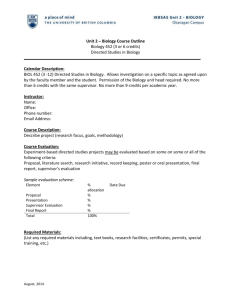
![July 31 Connect eupdate DRAFT [1]](http://s3.studylib.net/store/data/008100166_1-21bd0e395dcbfd67aaad5f18dd4ec08e-300x300.png)
